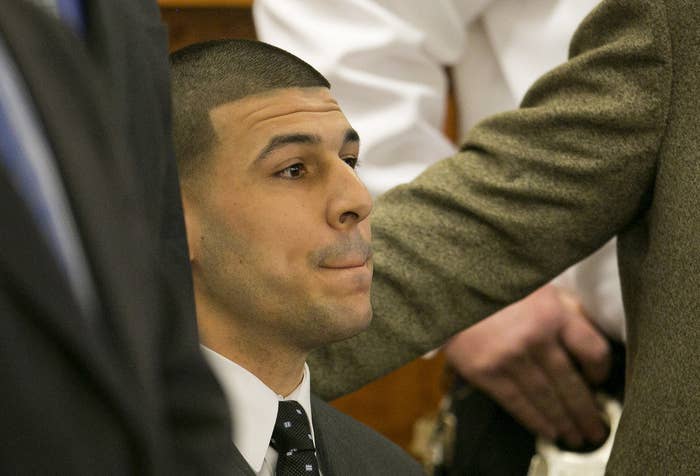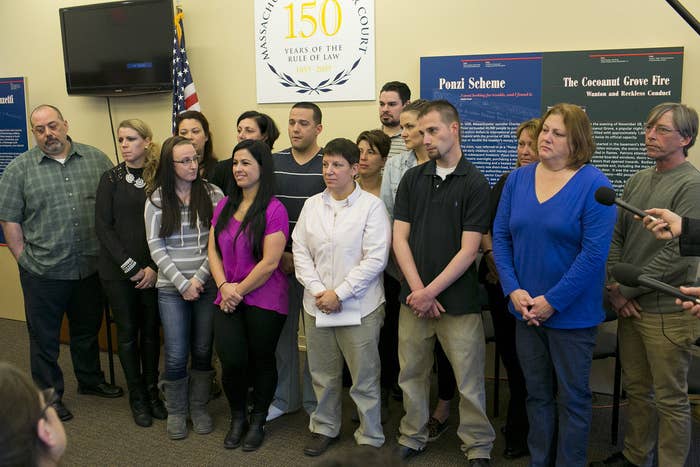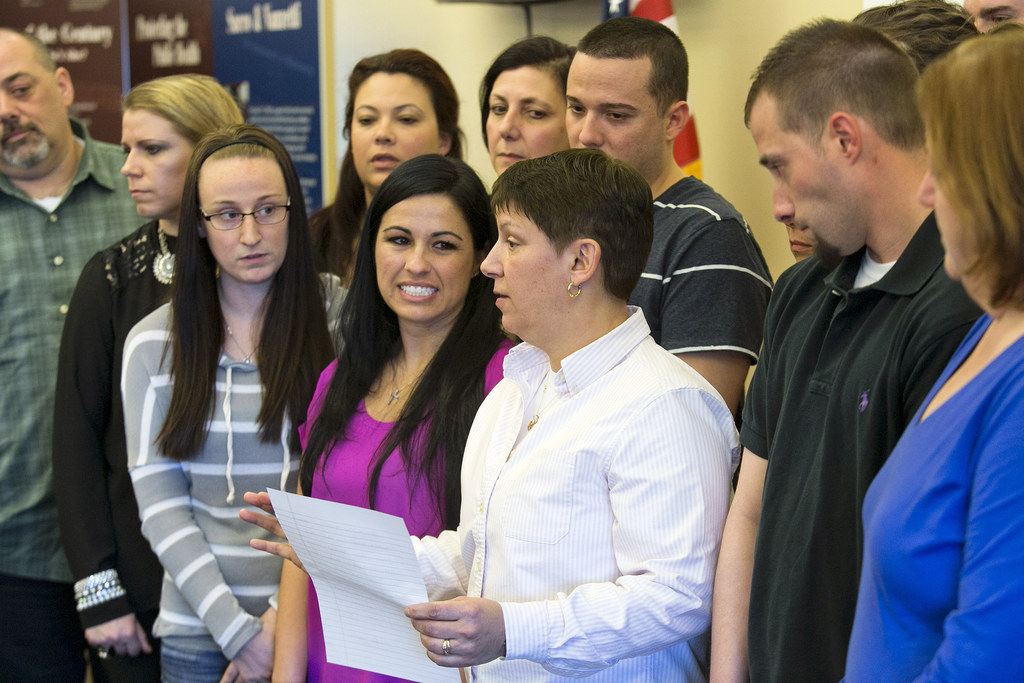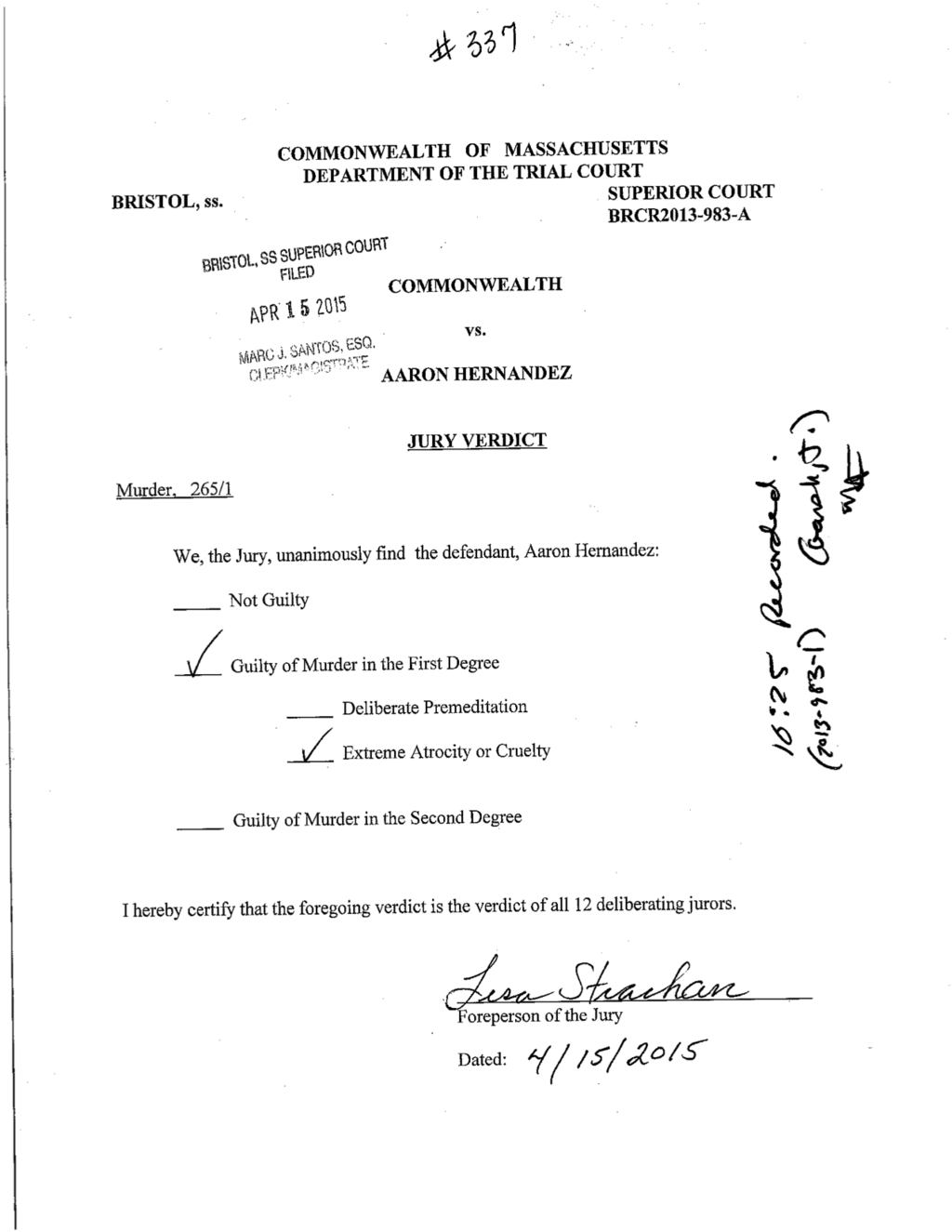
FALL RIVER, Massachusetts — A two-month trial and seven days of deliberations led to a jury of 12 people unanimously finding Aaron Hernandez guilty of first-degree murder, on the basis of "extreme cruelty or atrocity."
After forewoman Malessa Strachan delivered the verdict, Judge E. Susan Garsh addressed the jury privately and thanked them for their service.
Garsh told jurors that Hernandez is set to stand trial in Boston as the defendant in a double homicide case, along with other assault allegations. The judge said Hernandez allegedly shot his former friend, Alexander Bradley, between the eyes in Florida. Bradley, who recently testified against him, has a noticeable scar from the shooting.
Hearing about other allegations of murder — or attempted murder — by Hernandez reassured the jury they had "done the right thing" by returning a first-degree murder verdict.
Hernandez was immediately sentenced to life in prison without the possibility of parole.
Typical courthouse protocol is to disallow reporters from speaking with released jurors until they are outside the courthouse, but because of the high-profile nature of this case, the Bristol County District Attorney's Office made special arrangements to mutually benefit the jurors and the story-hungry media.
The 12 jurors and three alternates were brought into the jury selection room and stood before the media.

They joked that they had agreed to the arrangement because they hoped it would reduce the likelihood of media "showing up at [their] homes."
Strachan immediately read a short prepared statement:
"To the family of Odin Lloyd, we would like to say we know this verdict will not bring him back, but we do hope this will help you find peace and bring you some closure. We would also like to thank everyone in advance for respecting our privacy."
The jurors refused to speak about any conversations that might have occurred during their 35 hours of deliberations. The only explanation given for the lengthy deliberation period was the seriousness of the crimes with which Hernandez was charged, and the sentencing implications.
Jurors said they were "not prepared" for the extreme emotional reaction that rippled through the crowded courtroom as soon as the murder conviction was announced.
Announcing the verdict was the "hardest thing I'd ever done in my life, by far," said Strachan. She said that if she could speak with Hernandez, who stared the jurors down upon every entrance and exit from the courtroom, she'd have "nothing" to say to him.
During closing statements, Hernandez's attorney James Sultan admitted that his client was likely at the scene of the crime with two other friends, but claimed the Commonwealth had not proven it was anything more than a wrong-place, wrong-time situation.
The jurors called that decision "shocking," but would not discuss how heavily it weighed on their decision.
Later that day, Bristol County District Attorney Tom Quinn told reporters that Sultan's admission was not much more than a "strategic decision" by his team's opponents.
During the extensive and oftentimes dramatic jury selection, each potential juror was brought to the front of the courtroom to be questioned about his or her ability to be fair and unbiased. On Wednesday, jurors confessed it was "awkward and uncomfortable" to have Hernandez huddled behind them while the judge questioned them.
However, Sean Traverse assured the room that he understood his role was to avoid judging Hernandez until his team was sent for deliberations.

"You must assume the man sitting in that seat was innocent until prosecution proves he is guilty, which they did today," he said.
A reporter asked the jurors if they believed the two-day testimony of Shayanna Jenkins, Hernandez's fiancée, who is believed to have disposed of the murder weapon. On the stand, Jenkins claimed she couldn't remember large details about her and Hernandez's behavior in the days after the killing.
"We're not going to comment," the jurors chimed, while smiling and looking at each other knowingly.
Juror Jon Carlson said he found New England Patriots owner Robert Kraft's testimony to be particularly compelling (there were 133 witnesses in all) because of a quote from Hernandez that pointed to an evidential inconsistency.
The day after Lloyd's murder, while helicopters and media circled outside Gillette Stadium, Hernandez allegedly told Kraft he "wished they would release the time of [Lloyd's] death," because he was "at a club" at the time.
It was an attempt at an alibi that was never supported by evidence.
However, Carlson thought to himself, "[Prosecutors and investigators] still haven't determined the exact time of death? How did [Hernandez] know it then, two years ago?"
The minuteness of the detail and the large impact Carlson said it had on his decision to send Hernandez away for life speaks particularly well to the seriousness with which the team took their civic duty.
Since the trial began in January, presiding Judge Garsh closed each session by asking the jury to be "vigilant" in their avoidance of outside knowledge or discussion about Hernandez and his case.
"I would ask that you keep your minds suspended," she instructed jurors.
Now free to resume their everyday lives, the jury has just one more order of business on their docket.
A reporter asked, "Are you guys gonna go get drunk now?"
"Yes," a juror replied. "And that's on the record."

